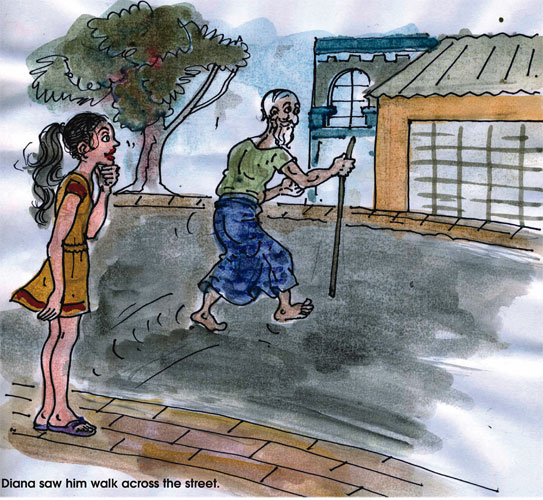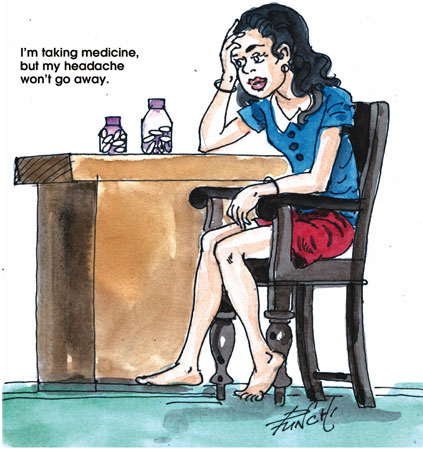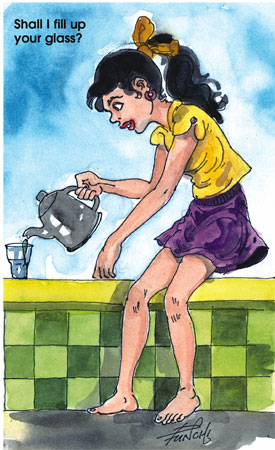|

by R.S. Karunarathne
See it happen/ See it happening
See it happen
After some verbs we can use an object + an infinitive without 'to.'
Mary saw her sister fall down the steps.
I heard somebody open the door.

Let's watch the dancers go past the school.
We all felt the earth shake.
Diana saw him walk across the street.
See it happening
Mary saw her sister falling down the steps.
I heard somebody opening the door.
Let's watch the dancers going past the school.
We all felt the earth shaking.
Diana saw him walking across the street.
Two actions at the same time
When two actions happen at the same time, we can use a main verb and
another verb with the '...ing' form.
Kalyani lay in bed reading a novel.
People stood in a queue waiting to buy bread.
Sando injured his leg doing gymnastics.
He went to bed listening to the radio.
Sam poured a drink after opening the bottle.
Sajith made copies of his speech before delivering it.
One action after another
Turning to the left he drove along Main Street.
Opening the bottle, Sam poured a drink.
Having opened the bottle, Sam poured a drink.
Having repaired the car, the mechanic took it out for a test run.
The '...ing' form to give a reason
Grandfather went to the club, hoping to meet his old friends.
Not knowing the way, Sadhana had to ask for directions.
Having spent all my money, I couldn't buy any clothes.
Having heard of the bomb explosion, we decided not to go to the Karachi
airport.
Quiz on idioms
An idiom is a kind of phrase. It is a group of words which have a
different meaning when used together from the one it would have if the
meaning of each word were taken individually. Tick the meaning of the
following idioms in bold type and check your answers with the key.
1. If you close the book on something ...
(a) you bring it to a definite end
(b) you postpone the transaction
(c) you begin to have second thoughts
2. When you say in my book ...
(a) you are telling the truth
(b) you are telling a lie
(c) you are stating your opinion
3. If someone's life is an open book ...
(a) you cannot find anything about him
(b) you can find everything about him
(c) you can guess what he has been doing
4. If you can read someone like a book ...
(a) you know what he is thinking
(b) you do not know anything about his plans
(c) you can guess what he will do
5. You can't judge a book by its cover ...
(a) you can judge people by looking at them
(b) your first impression is always right
(c) your first impression may be wrong
6. If someone cooks the books ...
(a) they dishonestly change the figures in their financial accounts
(b) they read books voraciously
(c) they throw the books away after reading
7. If you're in someone's bad books ...
(a) you're indebted to them
(b) you're one of their enemies
(c) you have done something that has annoyed them
8. If you are in someone's good books ...
(a) you've done something that has pleased them
(b) you receive financial help from them
(c) you always flatter them
9. If you're given the boot ...
(a) you are praised
(b) you receive a pair of shoes
(c) you lose your job
10. If someone dies with their boots on ...
(a) they die in their uniforms
(b) they die still actively involved in their work
(c) they die a natural death
***
Key
1. (a) 2. (c) 3. (b) 4. (a) 5. (c) 6. (a) 7. (c) 8. (a) 9. (c) 10.
(b)
Phrasal verbs

Some verbs have two parts. The second part is a small adverb. They
are called phrasal verbs.
Look out!
Come in and sit down.
Come back soon.
What time do you get up?
I'm taking medicine, but my headache won't go away.
Hurry up, we are late for the train.
He asked me to lie down.
Stand up when the principal comes.
The door was open and I went in.
Shall we go out this evening?
I heard somebody calling me and turned round.
We can't go on, shall we have some rest.
I'm going out, but I'll be back before noon.
A: I like to be with you for some time.
B: Go away.
Some phrasal verbs can have objects.
Please bring back my camera.
Fill in this form and hand it over to the counter.
Why don't you give up smoking?
Look up the meaning of this word in a dictionary.
Pick up the pen and start writing.
Put on your best clothes and attend the interview.
Switch off the lights when you leave office.
I want to take away some old newspapers.
Throw away all the unnecessary items.
Wash up the cups and plates after the party.
Shall I switch on the television?
He asked me to turn down the radio.

Don't throw away old magazines.
In phrasal verbs, 'up' often means 'completely.'
The man cut up the wood and went away.
We're going to clean up the classroom.
Fill up your glass with water.
She tore up the letter.
The 'small adverb' can be used before or after the object.
Switch on the radio.
Switch the radio on.
When the object is a pronoun, the 'small adverb' is used after it.
Switch it on.
They let us in.
"Take him away," the judge said.
He put on his shirt.
But: He put it on.
She washed up the plates.
But: She washed them up.
Could you turn down the television?
But: Could you turn it down?
You can throw away the rotten apples.
But: You can throw them away.
Take off your shoes.
But: Take them off.
Put down the gun.
But: Put it down.
Shall I fill up your glass?
But: Shall I fill it up?
Match words and meanings
Here's a novel way to enrich your vocabulary. Match the words in
column 'A' with their meanings in column 'B' and check your answers with
the key. The first has been done for you.
***_
Column A
R 1. composite
... 2. composition
... 3. compositor
... 4. compost
... 5. composure
... 6. comprehend
... 7. comprehensive
... 8. compress
... 9. compulsion
... 10. compulsive
... 11. comradeship
... 12. conceal
... 13. concede
... 14. conceivable
... 15. concentrate
... 16. concept
... 17. concerning
... 18. concert
... 19. concessionary
... 20. conch
... 21. concise
... 22. conclave
... 23. conclude
... 24. concord
... 25. Concur
***_
Column B
A. decaying plant material
B. to hide something
C. a large spiral shell
D. short and clear
E. a private meeting
F. to end
G. peace between
countries and people
H. a performance of music
I. calmness and control
J. about
K. idea
L. to admit
M. unable to stop doing something
N. a very strong wish
O. complete
P. one who arranges
letters in a book
Q. a short piece of writing
R. made of different parts
S. to agree with somebody
T. at a lower price than
usual
U. to direct your attention to something
V. possible to imagine
W. the feeling of
friendship
X. to press something into a smaller space
Y. understand
***_
2. Q 3. P 4. A 5. I 6. Y 7. O 8. X 9. N 10. M 11. W 12. B 13. L 14. V
15. U 16. K 17. J 18. H 19. T 20. C 21. D 22. E 23. F 24. G 25. S |

